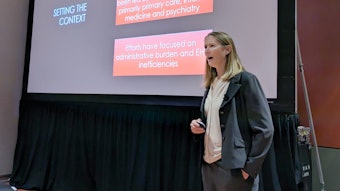Addressing impaired performance: A call for compassionate intervention
Session encourages a cultural shift from confrontation to intervention.

Impaired professional performance among health care clinicians, particularly physicians, is a growing concern that demands both attention and compassionate action. Whether performance is affected by substance use disorders (SUDs), mental health, or burnout, a delay in addressing performance issues can negatively impact patient safety and the needs of the clinician.
Alcohol misuse affects 10%–20% of physicians, while 1%–2% of anesthesiologists struggle with occupation-related SUD, often due to the accessibility of substances in the perioperative environment. The highest rate occurs in the first five years after medical school. Alarmingly, death is the first sign of impairment in up to 10%–20% of relapse cases, and at least 40% of physicians who return to practice after treatment experience relapse.
Understanding indicators of impaired performance and developing a workplace intervention strategy are essential and achievable, said Michael Fitzsimons, MD, Vice Chair of Faculty Development at Mass General Brigham Anesthesiology in Boston and moderator of Saturday’s session “Professional Intervention: When Concerns Arise Because Performance Has Fallen.”
“Physicians, like all members of society, suffer from physical and emotional medical conditions. Impaired performance may harm the patient, physician, and our health care systems,” Dr. Fitzsimons said. “The motto of the American Society of Anesthesiologists is ‘Vigilance,’ and our symbol is the lighthouse, a mark of the eternal watch. We must perform at the highest level always and possess the ability to respond immediately to threats or crises. Impaired performance degrades our abilities.”
Despite these risks, many physicians are reluctant to seek help. Fear of stigma, professional repercussions, and licensing sanctions often prevent them from addressing their own health needs, Dr. Fitzsimons said. Colleagues, too, hesitate to intervene, citing uncertainty, fear of being wrong, or concern about causing distress.
“We assume that someone else is taking care of the problem,” Dr. Fitzsimons said. “We often do not know who to go to when we see performance or behavior that deviates from what we consider normal. We also believe that the problem can happen to us, and we will be able to handle it on our own.”
As the health care community continues to grapple with the pressures of modern medicine, ASA aims to empower professionals to support one another, intervene when necessary, and foster a culture of vigilance and compassion. A number of tools and resources can be found on ASA’s “Well-Being Resources” webpage.
Dr. Fitzsimons will be joined by speakers Amy Vinson, MD, FAAP, Assistant Professor of Anesthesia at Harvard Medical School in Boston, and Catherine Kuhn, MD, Professor of Anesthesiology at Duke University School of Medicine in Durham, North Carolina, to share how early, respectful, and structured interventions can make a difference.
According to the panelists, key components of a successful intervention include:
- Acting early despite uncertainty
- Ensuring privacy and dignity
- Focusing on support rather than punishment
- Involving trained mental health professionals
- Maintaining follow-up and confidentiality.
“We ideally design systems that prevent the development of impairing conditions such as SUD, depression, and burnout. Prevention of SUD involves education, substance control, surveillance of medication use, and returned drugs, and, in some institutions, pre-placement and random drug testing,” Dr. Fitzsimons said. “Education is a critical component to provide insight into the causes and contributors to depression and burnout. Online self-screening modules have proven effective in increasing the use of mental health services and, in some cases, reducing suicidal ideation and death by suicide.”
Dr. Fitzsimons said the initial interaction with a colleague whose performance or behavior is concerning is one of the most critical aspects of providing care. Often referred to as a “confrontation,” which implies an adversarial relationship, it rather should be considered an “intervention,” he said.
“An intervention is the initial formal interaction with a colleague whose performance or other concerns indicate a risk of self, patient, or colleague/system harm. It is not a technicality with a forgone conclusion, a formal investigation, or an insincere action merely to document contact,” he said.
Also, Dr. Fitzsimons said state licensing questionnaires have changed over time, reducing the number of questions that unfairly address physical and health problems that do not impair performance or affect competency when provided with appropriate accommodations. However, the licensing still has a way to go, he said.
The overarching message is clear, he said. Impaired performance is often due to treatable conditions, and a well-organized intervention can restore a physician’s ability to practice safely and effectively. The session encourages a cultural shift — one that prioritizes care over confrontation and recognizes that mental health challenges are not signs of weakness, but opportunities for healing.
“We need to care for our colleagues. We should not be reluctant to bring concerns to our colleagues in a professional, confidential, caring, and open manner,” Dr. Fitzsimons said. “The next step in physician health is eliminating our fear of intervening with colleagues when there is evidence or known factors that endanger mental health, such as problems with relationships, finances, litigation, physical health, and mental health issues that have manifested at work.”

